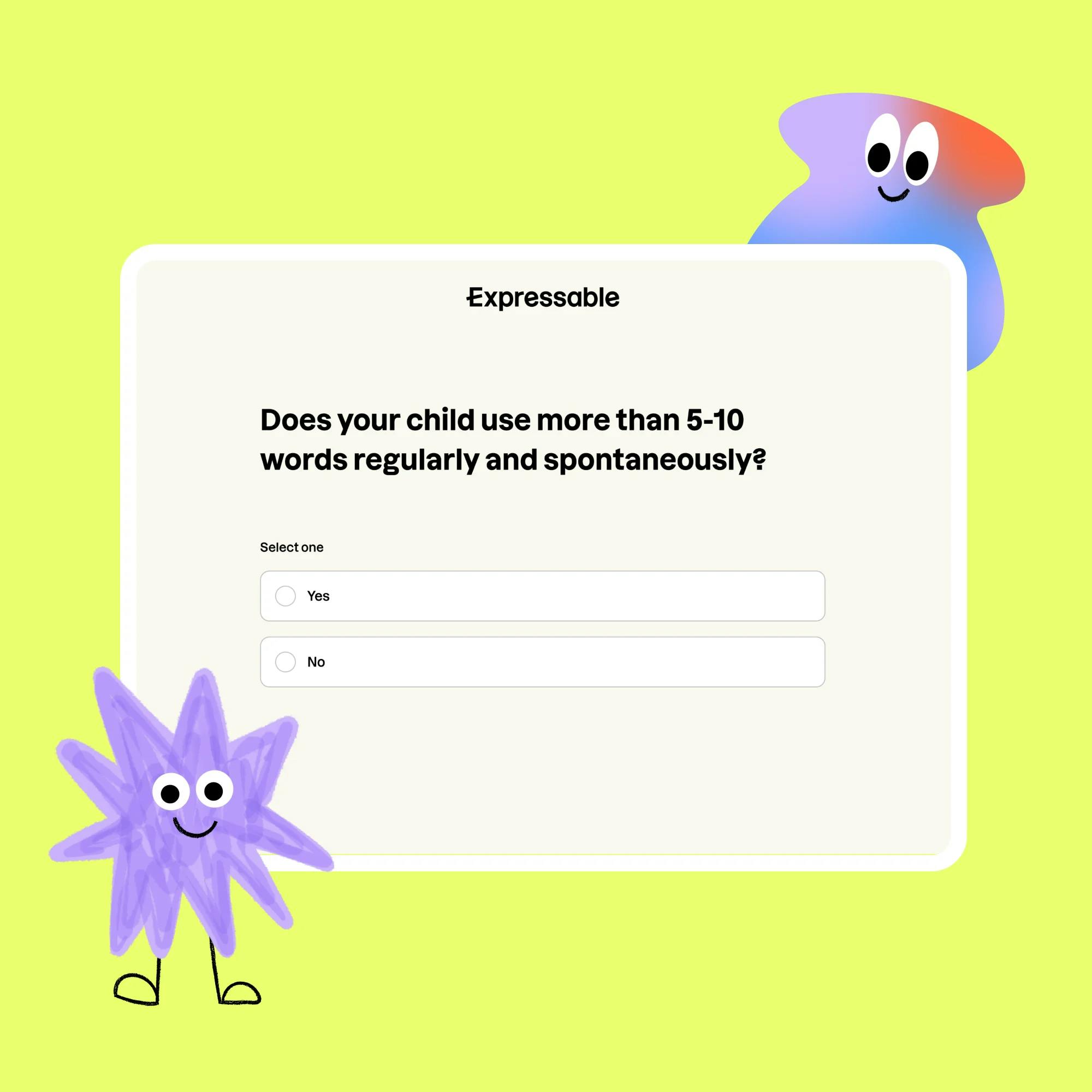What is Einstein syndrome? It’s a term that often sparks curiosity, especially for parents of toddlers who are late talkers. At Expressable, we hear from families who are wondering whether their bright, inquisitive child might have Einstein syndrome.
While the name brings Albert Einstein to mind, Einstein syndrome isn’t about IQ alone. It refers to children (often toddlers) who have advanced skills in areas like memory or problem solving, but also have a delay in speech and language.
Let's take a look at the signs of Einstein syndrome, what Einstein syndrome can look like in toddlers, and how early speech therapy can help support your child’s communication growth.
Is your child on track?
Take our free screener to learn more about your child's development and whether a speech evaluation is recommended.
 Screener for children
Screener for childrenWhat is Einstein syndrome?
Einstein syndrome is when a child starts talking later than expected but shows advanced skills in other areas, such as music, memory, or problem solving. These children may have a delay in speech, but they are often highly intelligent and analytical.
The term “Einstein syndrome” was introduced in 1993 by American economist Thomas Sowell. He observed that some late-talking children did not have a developmental disorder, but instead went on to do very well in school and life. Later, Dr. Stephen Camarata, a speech and hearing science professor at Vanderbilt University, supported the idea behind this term.
It's important to know that Einstein syndrome in toddlers is not a formal medical diagnosis. It does not appear in the DSM-5, which is the guide professionals use to diagnose developmental and mental health conditions. There are no official tests for Einstein syndrome. Instead, it is a descriptive term based on a child’s behaviors, strengths, and development. Knowing what Einstein syndrome is can help parents understand how to support their child as they grow.

Signs and symptoms of Einstein syndrome in toddlers
While there’s no official checklist or diagnosis, certain traits are commonly observed in toddlers with Einstein syndrome:
Delayed potty training
Very strong-willed
Strong memory skills
Early reading abilities, number recognition and understanding, or technological skills
Being analytical or musically talented
Selective, specific interests
Longer focus on preferred items and interests
One of the most common Einstein syndrome symptoms is a significant delay in speech. However, once talking begins, the child usually shows no difficulty with communication.
If you recognize these Einstein syndrome signs and symptoms in your child, speech therapy can still be helpful. Supporting communication early can set the foundation for more growth later on.


When do boys start talking? Is it normal for boys to talk later than girls? Learn what to look for in your child’s speech and language development.
Conditions that look like Einstein syndrome
If your child is showing signs of a language delay, you may wonder if it could be Einstein syndrome. While some children are simply late talkers with strong skills in other areas, it’s important to consider other possible explanations.
There are several conditions that can look similar to Einstein syndrome, especially in toddlers. An evaluation by a speech-language pathologist can help identify the cause of a speech delay and guide next steps. You can click here to get matched with an Expressable speech therapist and schedule an evaluation at a time that works for your family.
Autism
One common sign of autism is delayed speech. However, autism includes more than just speech delay. It often comes with differences in social interaction, play, and behavior. A professional should observe the child as a whole, not just their speech, to determine whether the signs point to autism or something like Einstein syndrome in toddlers.


Will my autistic child learn to talk? Learn how speech therapy helps nonverbal or minimally verbal children build meaningful communication.
Childhood apraxia of speech
Childhood apraxia of speech (CAS) is a motor speech disorder that affects how the brain communicates with the muscles needed to speak. A child with CAS wants to talk and may understand language well, but has trouble making their mouth say the right sounds. A speech therapist can assess a child’s motor planning to help rule out apraxia as a cause of delayed speech.
Hearing issues
If a toddler isn’t talking yet, it’s important to check their hearing. Hearing loss (even mild) can impact how a child learns sounds and words. Since hearing is key to language development, every late talker should have a hearing test to rule this out.


Here’s what might be happening if your 2-year-old understands everything but isn’t talking yet, or if they babble but don't use words.
How do you know if your child has a speech delay?
If you're wondering whether your toddler is a late talker or may have Einstein syndrome, it can help to review typical communication milestones. While every child develops at their own pace, there are general speech and language skills expected at each age.
Here are age-based guides to help you better understand if your child is on track:
We offer an easy online screener that can help you determine if a speech evaluation is recommended for your child. It takes just a few minutes to complete. Based on your child’s age, you’ll answer simple questions about their speech and language skills and get instant results. Whether you're concerned about Einstein syndrome, a general speech delay, or just want peace of mind, this tool is a great place to start.
Concerned about your child's speech?
We're here for you. Get matched with a speech therapist who's experienced in your child's area of need and available when you are.
 Find a speech therapist
Find a speech therapistEinstein syndrome treatment: Can speech therapy help?
If you think your child has a speech delay or is showing symptoms of Einstein syndrome, talk with your pediatrician and contact a speech therapist. Your pediatrician can refer you to a speech therapist if needed.
While speech therapists won't formally diagnose Einstein syndrome, they do treat the speech and language delays that are part of it. At the core of Einstein syndrome symptoms is late talking, and that's where speech therapy can help.


Do speech-delayed toddlers catch up? Learn the signs of speech delay vs. late talking, when to seek help, and how speech therapy supports communication growth.
Whether your child is showing symptoms of Einstein syndrome or has another reason for delayed speech, speech therapy can support their communication growth. A speech therapist will create a plan that builds your child’s vocabulary, sentence skills, and confidence in expressing themselves.
Everyone deserves to be able to clearly communicate their thoughts and needs. And speech therapy can help your child reach these milestones faster! Find the right speech therapist for your child and get started today.
How Expressable Can Help
Concerned your child isn't reaching age-expected milestones? Looking for communication support from a professional? Expressable is a national online speech therapy practice serving children and adults. We treat all major areas of communication and feeding, offer flexible hours including evenings and weekends, and accept most major health insurance plans. We’re proud to have earned more than 3,000 5-star reviews from our clients (4.9/5 average).
Our therapy model is centered on parent and caregiver involvement. Research proves that empowering caregivers to participate in their loved one’s therapy leads to better outcomes. That’s why we combine live, 1-on-1 speech therapy with personalized education and home practice activities for faster progress.
Communication is more than words. It’s how we share how we feel and show who we are. We’re here to help you or your child do just that.

 Abby Barnes, M.S., CCC-SLP
Abby Barnes, M.S., CCC-SLP











